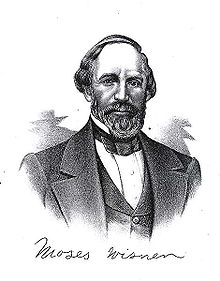Moses Wisner
Moses Wisner (born June 3, 1815 in Springport , Cayuga County , New York , † January 5, 1863 in Lexington , Kentucky ) was an American politician and from 1859 to 1861 the 12th governor of the state of Michigan .
Early years and political advancement
Moses Wisner attended local schools in his New York homeland. In 1837 he moved to Michigan, where he settled in Lapeer County . There he worked as a farmer and studied law on the side. After his admission to the bar in 1841, he became a district attorney in Lapeer County.
Until the early 1850s, Wisner showed little interest in politics. That changed with the escalation of the slavery question . As a staunch opponent of this institution in the southern states , he was one of the founding members of the Republican Party in 1854 . In 1854 his new party nominated him for the congressional elections, in which he was defeated by his democratic opponents. On November 2, 1858, he was elected the new governor of Michigan.
Michigan governor
Wisner began his two-year term on January 5, 1859. As governor, he drove the expansion of the road network in Michigan and the St. Mary's Canal was made navigable again. In addition to these infrastructure improvements, a General Registration Law was enacted for citizens of Michigan and a law school was established at the University of Michigan .
After his term of office expired on January 2, 1861, Wisner retired from politics and returned to work as a lawyer. During the Civil War he set up the 22nd Michigan Infantry Regiment in September 1862, whose command he should take over as a colonel. On the way to the front he fell ill with typhus and died in Lexington in early January 1863. Moses Wisner was married to Angeline Hascall, with whom he had four children.
Web links
- Moses Wisner in the National Governors Association (English)
- Biography (English)
- Moses Wisner in the database of Find a Grave (English)
| personal data | |
|---|---|
| SURNAME | Wisner, Moses |
| BRIEF DESCRIPTION | American politician |
| DATE OF BIRTH | June 3, 1815 |
| PLACE OF BIRTH | Springport , New York |
| DATE OF DEATH | January 5, 1863 |
| Place of death | Lexington , Kentucky |

